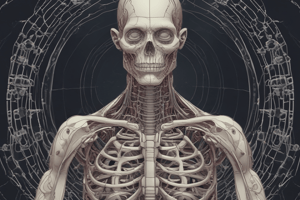Podcast
Questions and Answers
What role do arteries play in the circulatory system?
What role do arteries play in the circulatory system?
- They exchange oxygen and waste with the body.
- They are responsible for producing red blood cells.
- They carry oxygen-rich blood from the heart to the body. (correct)
- They return oxygen-poor blood to the heart.
Which part of the respiratory system is primarily responsible for gas exchange?
Which part of the respiratory system is primarily responsible for gas exchange?
- Diaphragm
- Trachea
- Alveoli (correct)
- Lungs
What function do ligaments serve in the musculoskeletal system?
What function do ligaments serve in the musculoskeletal system?
- They connect bones to other bones at joints. (correct)
- They connect muscles to bones for movement.
- They provide structure and support to the body.
- They cushion joints to prevent wear and tear.
During exhalation, what happens to the diaphragm?
During exhalation, what happens to the diaphragm?
In which part of the body does the heart pump blood to pick up oxygen?
In which part of the body does the heart pump blood to pick up oxygen?
What type of muscle is responsible for making the heart beat?
What type of muscle is responsible for making the heart beat?
Which structure protects the brain in the human body?
Which structure protects the brain in the human body?
What occurs in the body when a person exercises in terms of breathing?
What occurs in the body when a person exercises in terms of breathing?
What is the primary function of the digestive system?
What is the primary function of the digestive system?
Which type of tissue is responsible for sending signals throughout the body?
Which type of tissue is responsible for sending signals throughout the body?
What is the role of mucus in the digestive system?
What is the role of mucus in the digestive system?
Which organ is primarily responsible for nutrient absorption?
Which organ is primarily responsible for nutrient absorption?
What are the major types of tissues mentioned?
What are the major types of tissues mentioned?
What primarily distinguishes cells from tissues?
What primarily distinguishes cells from tissues?
What is the role of the pancreas in the digestive system?
What is the role of the pancreas in the digestive system?
Which of the following correctly outlines the hierarchy of structure in animals?
Which of the following correctly outlines the hierarchy of structure in animals?
Flashcards
Animal Structure Hierarchy
Animal Structure Hierarchy
A step-by-step arrangement starting from cells to complete organisms
Epithelial Tissue
Epithelial Tissue
Protective tissue covering body parts like skin
Connective Tissue
Connective Tissue
Connects and supports body parts like bones and blood
Digestive System Function
Digestive System Function
Signup and view all the flashcards
Mechanical Digestion
Mechanical Digestion
Signup and view all the flashcards
Small Intestine
Small Intestine
Signup and view all the flashcards
Circulatory System Role
Circulatory System Role
Signup and view all the flashcards
Chemical Digestion
Chemical Digestion
Signup and view all the flashcards
Blood function
Blood function
Signup and view all the flashcards
Artery job
Artery job
Signup and view all the flashcards
Vein function
Vein function
Signup and view all the flashcards
Capillary role
Capillary role
Signup and view all the flashcards
Respiratory system main job
Respiratory system main job
Signup and view all the flashcards
Alveoli purpose
Alveoli purpose
Signup and view all the flashcards
Skeletal muscle type
Skeletal muscle type
Signup and view all the flashcards
Breathing process
Breathing process
Signup and view all the flashcards
Study Notes
Digestive System
- The digestive system breaks down food for nutrient absorption and waste removal.
- Parts include the mouth for chewing and saliva addition, esophagus for transport, stomach for chemical breakdown, small intestine for nutrient absorption, large intestine for water absorption, liver for bile production, pancreas for enzymes, and gallbladder for bile storage.
- Digestion involves mechanical (chewing, churning) and chemical (enzymes, acids) processes.
Circulatory System
- The circulatory system transports blood, oxygen, nutrients, and waste throughout the body.
- The heart is the pump, moving blood through arteries (oxygen-rich), veins (oxygen-poor), and capillaries (exchange).
Respiratory System
- The respiratory system facilitates gas exchange, taking in oxygen and releasing carbon dioxide.
- Parts include nose/mouth, trachea, lungs (alveoli), and diaphragm.
- Breathing involves inhalation (air intake) and exhalation (air expulsion).
Musculoskeletal System
- The musculoskeletal system provides structure, support, and movement.
- Components include bones (for protection and structure), ligaments (bone connections), cartilage (joint cushioning), and muscles (for movement).
- Muscles are categorized as skeletal (voluntary), smooth (involuntary digestive system), or cardiac (involuntary heart).
Nervous System
- The nervous system controls body functions through signal transmission.
- Parts include the brain (controls thoughts and actions), spinal cord (carries signals), and nerves (transmit signals).
- Neurons (nerve cells) have dendrites, axons, and synapses for signal transmission.
- Reflexes are involuntary responses.
Studying That Suits You
Use AI to generate personalized quizzes and flashcards to suit your learning preferences.



